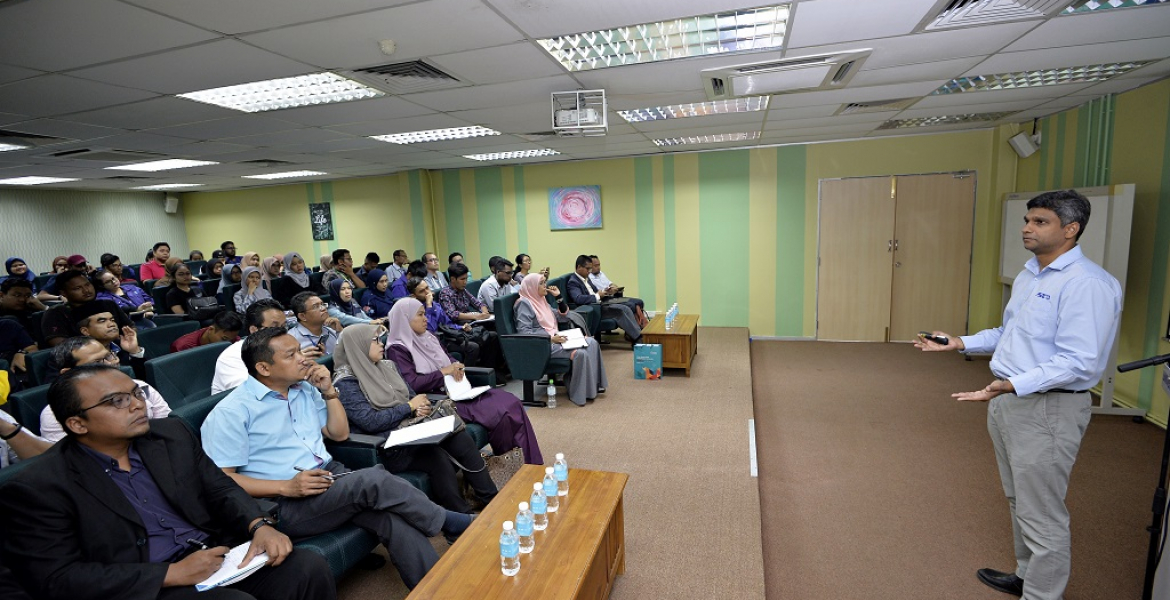Creating new technology for student preparation towards IR4.0
By: NUR SA'ADATUL AFZAN JUSOH, CORPORATE COMMUNICATION DIVISION.
Translation by : DR. ROZAIMI ABU SAMAH, FACULTY OF CHEMICAL AND PROCESS ENGINEERING TECHNOLOGY
Since the advent of the Fourth Industrial Revolution (IR 4.0) in the mid-2016 with automation technology, new challenges have emerged in all of the country's service and industrial sectors.
It demands a change in all aspects of digital transformation to remain competitive and accelerate the progress of the modern world, as it will have a direct impact on the future of the current working environment.
Robotics technology, Internet of things (IoT), artificial intelligence (AI), data analytics, image processing, software, mobile communication systems, three-dimensional (3D) printing, cybersecurity, simulation and digital system integration are among the new elements that have begun to take hold over the existing job functions and systems.
Among the areas that have also moved forward with the development of this revolution is education, where a serious focus is given towards the cooperation between educational and technical institutions and industries.
In higher education, for example, it revolves around talent development and the areas of new technologies, digital and engineering that aim at preparing graduates for the job market in intelligent manufacturing.
Penang Skills Development Centre Chief Executive Officer, Muhamed Ali Hajah Mydin outlined three key elements needed in the transition to IR 4.0, namely talent, process and technology.
“Talent focuses on individuals and entire organisations by emphasising strategies for creating a relevant workforce.
“Meanwhile, technology focuses on AI, networking and automation technologies at three different levels while process focuses on management systems involved in the operation, supply chain and product lifecycle,” he said.
However, he mentioned that we would also face some challenges that have been identified, especially from the industry, graduates, government and institutional levels.
“For example, the industry will face new and incompetent graduates; the challenges of today’s graduates who like to switch jobs within three years; and unstructured 3–6 months of industrial training.
“In fact, the Generation Y and Z graduates are faced with less exposure to real-world situations where they may be technically proficient but lack of collaboration and problem-solving skill,” he said.
Therefore, he also advised graduates to be exposed to industrial psychology.
Meanwhile, he added, the government is receiving pressure from the manufacturing industry, especially from multinational companies (MNCs) on human resource matters.
“The involvement of various ministries such as the Ministry of International Trade and Industry (MITI), the Ministry of Education and the Ministry of Human Resources should also be well coordinated.
“Meanwhile, at the institutional level, such as universities and polytechnics, challenges exist in terms of survival to address the rapid pace of technological change but at the same time bound to the requirements of the Malaysian Qualifications Agency (MQA) and the Department of Skills Development,” he said.
Muhamed Ali also suggested that the higher education system might require some changes as lecturers and graduates need to learn and create something new together.
He attended the Professional Talk Series titled “Transition Preparation: Talent, Technology, Process” organised by the Industry & Community Network Centre (ICoN) at the ICoN Seminar Room, UMP Gambang Campus on 24 September 2019.
Also present was the Director of the Industry & Community Network Centre (ICoN), Associate Professor Dr. Nurul Hazlina Nordin, Manager of ICoN, Mohd. Raizalhilmy Mohd Rais, UMP associates and other educational institutions around Kuantan.
Amirah Ibrahim, a student of the Faculty of Mechanical and Automotive Engineering Technology, thinks the program provides an opportunity to gain new knowledge on technology, mainly on how the IR 4.0 migration process can be implemented successfully.
“It can provide ideas and inspiration to motivate students and encourage them to invent or improve technology to meet the current needs,” she said.
- 461 views



 Reports by:
Reports by: 






